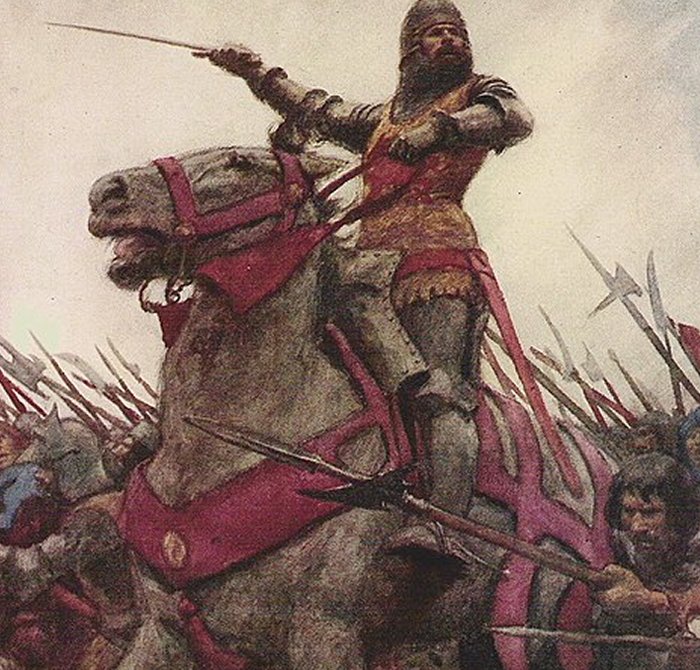Owain Glyndwr: Famous Medieval Welsh Warrior Prince And Symbol Of Independence
A. Sutherland - AncientPages.com - At the beginning of the 15th century, an uprising against the English resulted in the first and only Welsh-speaking parliament.
Owain Glyndwr by A.C.Michael. Arthur Cadwgan Michael (1881-1965) - Public Domain
One man was particularly unhappy with the chaos in his country. His name was Owain Glyndwr, and he is today known as the famous medieval Welsh warrior prince who fought against England. Owain Glyndwr is also widely recognized as a symbol of Welsh independence and patriotism.
Who Was Owain Glyndwr?
Owain Glyndwr was born in 1359 into a powerful family of the Anglo-Welsh nobility during a time of relative peace between the tribes of Wales and the English aristocracy.
His father, Gruffydd Fychan II, was a hereditary prince of Powys Fadog and Lord of Glyndyfrdwy, one of the lines of Welsh lords and princes who traced their royal lineage back to before the Norman conquest. His mother, Elen Ferch Tomas Ap Llywelyn of Deheubarth, was also of noble blood.
When Owain was 11 years old, his father died, and the young prince was fostered in the household of Sir David Hanmer, an Anglo-Welsh judge. Sir David Hanmer wanted Owain to study law at the Inns Of Court, but the young man never became a "man of law."
Owain Glyndwr was educated in England. He trained as a soldier and served with distinction for the English King before returning to Wales as a wealthy man ready to marry.
Glyndŵr statue at Cardiff city hall. Image credit: Seth Whales - Public Domain
However, he soon noticed people in his country were intimidated, and the law had no justice. The people of Wales desperately needed a leader who could change the situation in the country.
Owain Glyndwr's Revolt Against England
On September 16, 1400, Glyndwr instigated the Welsh Revolt against the rule of Henry IV of England. The immediate spark for Owain's revolt was his quarrel with his neighbor Reginald de Grey, Lord of Ruthin, who had stolen some land. Grey was close to the King, and the argument could not be resolved.
Glyndwr gathered loyal supporters around him, established an army at Ruthin, raised his battle flag, and started to drive out the English. He led a revolt against King Henry IV of England and rapidly gained power.
Shortly after Glyndwr's forces defeated Ruthin, the Welsh warrior followed up with attacks throughout north Wales. It was not long before he could claim the title Prince of Wales.
However, although initially successful, Glyndwr's uprising was eventually put down. The Englishmen were unhappy with the situation. The Englishmen sent many soldiers across north Wales, sacking and burning everything. In those days, the English army was Europe's largest and most effective.
Glyndwr was a wanted man. He and his supporters were forced to hide in the mountains. They stayed there the whole winter before emerging again the following year with a renewed campaign against the Englishmen.
Equestrian statue in Corwen. Image credit: Michael Garlick - CC BY-SA 2.0
For a brief time, the Prince of Wales and his army seized some castles such as Harlech, Conwy, and Aberystwyth, but the English army soon retook the fortresses, and Glyndwr was declared an outlaw. The English King Henry IV was determined to catch the Welsh warrior, but many loyal people surrounded him.
Llywelyn – Old Welsh Man Who Was Loyal To The Welsh Prince Until The End
One of them was Llywelyn ap Gruffydd Fychan, a local landowner from the village of Caeo. For many weeks, the Englishmen tried to force him to reveal the hiding place of Owain Glyndwr, but the older adult refused to say anything.
Eventually, king Henry IV lost his patience and ordered him to torture Llywelyn. However, Llywelyn was a patriot and loyal supporter of Owain Glyndwr and refused to say anything. So, King Henry IV decided to execute the old Welsh man. Llywelyn was dragged to the center of Llandovery and publicly executed in the same manner as Sir William Wallace, the brave Scottish knight and legendary hero.
What happened to Owain Glyndwr is not entirely known, but one thing is sure, he was never betrayed by his people and quietly disappeared into obscurity.
Written by – A. Sutherland AncientPages.com Staff Writer
Updated on December 21, 2022
Copyright © AncientPages.com All rights reserved. This material may not be published, broadcast, rewritten or redistributed in whole or part without the express written permission of AncientPages.com
Expand for referencesReferences:
Davies R. R., Owain Glyndwr - Prince Of Wales
Glanmor W., Owain Glyndŵr
Owain Glyndŵr (Wikipedia)
More From Ancient Pages
-
 The Ancient Giants Who Ruled America: The Missing Skeletons And The Great Smithsonian Cover-Up
Biblical Mysteries | Apr 26, 2014
The Ancient Giants Who Ruled America: The Missing Skeletons And The Great Smithsonian Cover-Up
Biblical Mysteries | Apr 26, 2014 -
 Georgia Guidestones Damaged By An Explosive Device – By Whom And Why?
News | Jul 7, 2022
Georgia Guidestones Damaged By An Explosive Device – By Whom And Why?
News | Jul 7, 2022 -
 Mythical Submerged City Of Ys – Europe’s Own Sodom And Gomorrah
Featured Stories | Feb 1, 2023
Mythical Submerged City Of Ys – Europe’s Own Sodom And Gomorrah
Featured Stories | Feb 1, 2023 -
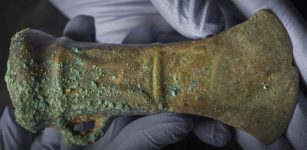 Mysterious Havering Hoard – Largest Ever Bronze Age Hoard Discovered In London
Archaeology | Oct 21, 2019
Mysterious Havering Hoard – Largest Ever Bronze Age Hoard Discovered In London
Archaeology | Oct 21, 2019 -
 Ancient Mexican City Endured For Centuries Without Extremes In Wealth And Power
Archaeology | Mar 8, 2022
Ancient Mexican City Endured For Centuries Without Extremes In Wealth And Power
Archaeology | Mar 8, 2022 -
 Ancient Village Of Zalipie Where Flowers Are Painted On All Houses
Ancient Traditions And Customs | May 29, 2019
Ancient Village Of Zalipie Where Flowers Are Painted On All Houses
Ancient Traditions And Customs | May 29, 2019 -
 Startling Discovery Of Nubian Levallois Technology In Shukbah Cave Re-Writes Ancient History Of Neanderthals And Homo Sapiens
Archaeology | Feb 24, 2021
Startling Discovery Of Nubian Levallois Technology In Shukbah Cave Re-Writes Ancient History Of Neanderthals And Homo Sapiens
Archaeology | Feb 24, 2021 -
 Saraswati – Hindu Goddess Of Knowledge, Learning And Vedic Symbol Of Speech, Vach
Featured Stories | Jun 23, 2021
Saraswati – Hindu Goddess Of Knowledge, Learning And Vedic Symbol Of Speech, Vach
Featured Stories | Jun 23, 2021 -
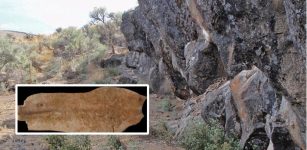 18,000-Year-Old Relics Discovered In Oregon – Oldest Home In North America?
Archaeology | Jul 12, 2023
18,000-Year-Old Relics Discovered In Oregon – Oldest Home In North America?
Archaeology | Jul 12, 2023 -
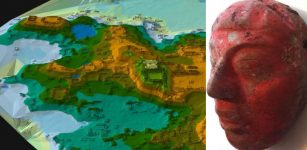 Ancient Tomb Of Maya Ruler Te’ Chan Ahk Discovered In Guatemala
News | Sep 14, 2017
Ancient Tomb Of Maya Ruler Te’ Chan Ahk Discovered In Guatemala
News | Sep 14, 2017 -
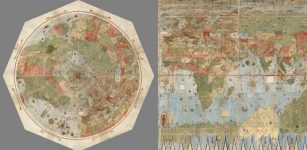 Unique Ancient Map Depicting The Earth As Seen From Space Restored Digitally
Archaeology | Dec 18, 2017
Unique Ancient Map Depicting The Earth As Seen From Space Restored Digitally
Archaeology | Dec 18, 2017 -
 Mysterious Underground City In Brazil Could Re-Write Ancient History – Riddle Of The 12 Men – Part 2
Ancient Mysteries | Jan 26, 2022
Mysterious Underground City In Brazil Could Re-Write Ancient History – Riddle Of The 12 Men – Part 2
Ancient Mysteries | Jan 26, 2022 -
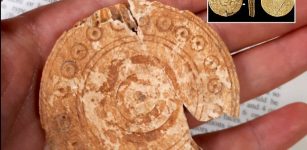 A Large ‘Tableman’ Sheds Some Light On People’s Fun And Games In Medieval Bedfordshire
Archaeology | Jun 19, 2023
A Large ‘Tableman’ Sheds Some Light On People’s Fun And Games In Medieval Bedfordshire
Archaeology | Jun 19, 2023 -
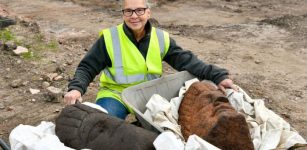 Unique And Priceless Large Roman Sculptures Found At Carlisle Cricket Club
Archaeology | May 25, 2023
Unique And Priceless Large Roman Sculptures Found At Carlisle Cricket Club
Archaeology | May 25, 2023 -
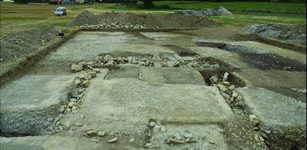 Stone Homes Of Europe’s First Megalithic Builders Discovered
Archaeology | Feb 22, 2023
Stone Homes Of Europe’s First Megalithic Builders Discovered
Archaeology | Feb 22, 2023 -
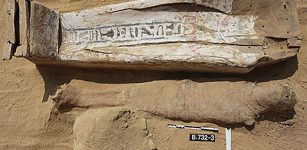 2,000-Year-Old Poorly Preserved Mummies Unearthed Near Saqqara’s Pyramid of Djoser
Archaeology | Jul 3, 2019
2,000-Year-Old Poorly Preserved Mummies Unearthed Near Saqqara’s Pyramid of Djoser
Archaeology | Jul 3, 2019 -
 Evidence Of Unusual Solar Activity Discovered On Ancient Cuneiform Tablets
Archaeology | Oct 16, 2019
Evidence Of Unusual Solar Activity Discovered On Ancient Cuneiform Tablets
Archaeology | Oct 16, 2019 -
 Why Have So Few Who Have Seen This Mysterious Victorian-Era Entity Survived?
Featured Stories | Sep 8, 2024
Why Have So Few Who Have Seen This Mysterious Victorian-Era Entity Survived?
Featured Stories | Sep 8, 2024 -
 Has The Mystery Of The Secret Sarcophagus Found At Notre-Dame Cathedral Been Solved?
Archaeology | Sep 25, 2024
Has The Mystery Of The Secret Sarcophagus Found At Notre-Dame Cathedral Been Solved?
Archaeology | Sep 25, 2024 -
 Neanderthals Of The Mediterranean Areas Became Extinct But Not Because Of Climate
Archaeology | Jul 20, 2020
Neanderthals Of The Mediterranean Areas Became Extinct But Not Because Of Climate
Archaeology | Jul 20, 2020

